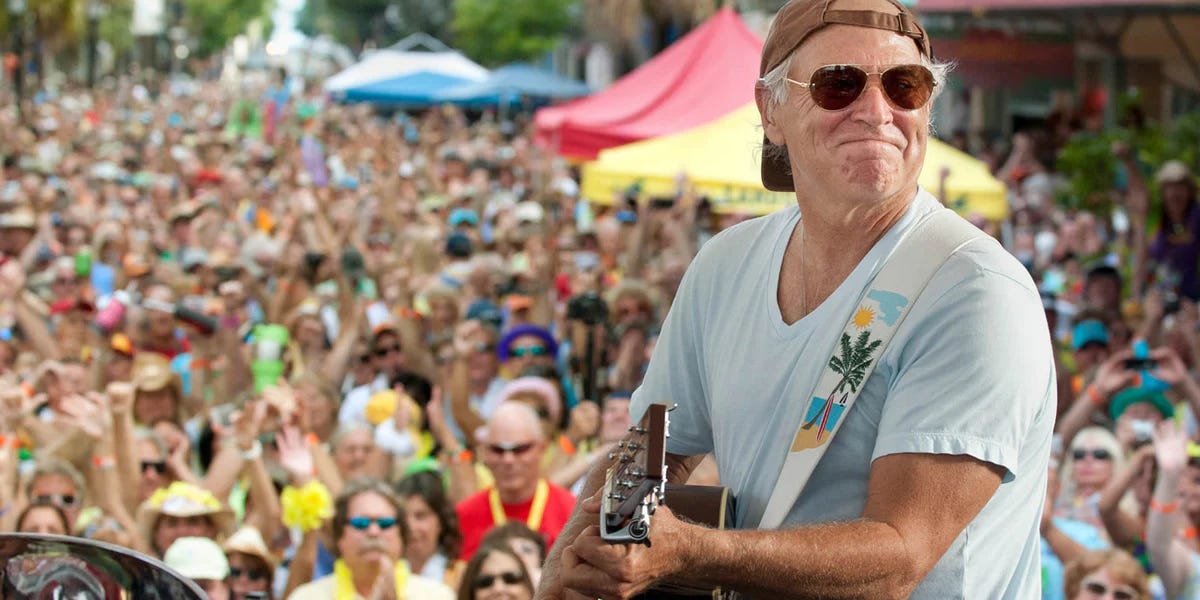Deadheads and Parrot Heads
Two countercultures seeking to reclaim a sense of self through community.
Image: Jimmy Buffett: islandjay.com
The top was down on Dougie’s little MG convertible when we pulled into the parking lot filled with all the inflatables, tiki torches, and reverie that inevitably accompanied a Jimmy Buffett concert. It was thirty years ago, but I will always remember the collective playfulness in the air at Merriweather Post Pavilion in suburban Maryland. The night before, I had been at Chicago’s Soldier Field watching the Grateful Dead perform. Twenty-four hours and one plane ride from O’Hare later, I traded tie-dyes for Hawaiian shirts, Deadheads for Parrotheads. But the underlying impulse among both groups was the same. They were quintessentially American countercultures seeking to reclaim a sense of self through community, acceptance through rejection, and meaning through play.
Buffett’s music was an intelligent stew of insightful character studies of people outside the mainstream, mournful ballads, hopeful incitements to what humanity could be at its best, and Bacchanalian celebrations of what it could be at its most crude. It covered the range of human emotions from loss of love and loss of self to the adoration of romantic partners and children. But most of all, it urged us to remain in touch with our own inner fruitcake, the American yearning for rugged individualism recast in terms of innocuous eccentricities. By strumming his six-string, he told us to be unafraid to break out of the grey-suit world in order to embrace bright colors and the freedom the system is trying to take from you.
Image: Parrott Heads: msn.com
His group’s name, “The Coral Reefer Band,” had a pirate edge, a clever drug reference well before the legalization of marijuana appeared on the horizon. Yet, the Parrotheads that came to rally around it were very different from the Deadheads, another music-based counterculture associated with that substance. Each had an archetype that it held up as the path to emancipation from the sterile corporate-controlled culture, but those paradigmatic caricatures differed in ways that demonstrate the ways the groups themselves varied.
For Deadheads, the iconic image was that of the hippie embracing a collectivist picture of peace and love that would replace the existing social structure with a new way of living, one that took us either back to the land or across it in a microbus, either one connected with a communal approach to being and an expanded consciousness. Married to a romanticized picture of the 1960s, you had to free your mind in order to turn on, tune in, and drop out. American values, on this view, had become corrupted and needed to be replaced.
But for Parrotheads, the solution to the alienation of modernity was less radical. Their symbolic character was the beach bum. Sand, waves, margaritas: it is the stuff of vacations. The boss may own your soul for fifty weeks a year, but those other two…that was when you got to be the real you, escaping to the warmth of the sun, enjoying the breeze off the ocean and the buzz from cracking open a couple of cold ones in the middle of the day. It was life at its best and the beach bum embodies the fantasy of allowing it to last, of not going back to the drudgery of the office, of running away to live a laid-back, minimalist life with just a blender, a guitar, and a year-round tan.
Image: Deadheads at Red Rocks: full-stop.net
Jimmy Buffett thereby provided a simpler, easier solution to achieving human flourishing in a time of alienation: an unending holiday. As you drive down from Cincinnati, your attitude will automatically reset itself like your GPS—recalculating, recalculating, recalculating—the closer you get to the ocean. You don’t need a revolution, you just need to escape. You don’t need to surrender the comforts of modern life, just supersize your vacay.
But, of course, you couldn’t. You had a mortgage. The kids needed to go to practice right after the orthodontist appointment that was right after school. Maybe if you hit the lottery, you could afford to live the simple salt life. The trap is effective. It gets almost all of us. We are stuck and we know it. No matter how much we wish we had the courage to leave Wall Street and our high-fashioned model wife and wake up in Africa on our next adventure, that is not us.
But at a Buffett concert, it could be. We could relax because the rules were relaxed. We were not tearing down the American dream but living the dream: happily and collectively singing, dancing, drinking, and laughing. Jimmy Buffett created a metaphorical island that he brought to us. He saw the sadness, the loneliness, the disaffection and he made a portal out of a porthole, a window through which we could escape our lives and embrace ourselves. It was a noble calling and a valiant achievement. With his words and music, he safely extracted the strange from estrangement, granting permission for the normal to refuse social norms, at least for a little while. He let us be human in a world that is trying to take that away from us without demanding that we tear down the world. And now that the world is without him, we can only say thank you.









Parrothead for life here!
Buffett was fun but it was hedonism. The Dead was more about consciousness. As for me, I'll take Bob Dylan and The Band's works.